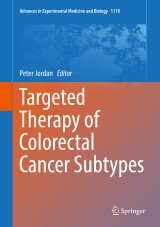Details

Targeted Therapy of Colorectal Cancer Subtypes
Advances in Experimental Medicine and Biology, Band 1110
|
149,79 € |
|
| Verlag: | Springer |
| Format: | |
| Veröffentl.: | 08.01.2019 |
| ISBN/EAN: | 9783030027711 |
| Sprache: | englisch |
Dieses eBook enthält ein Wasserzeichen.
Beschreibungen
Colorectal cancer (CRC) is a leading cause of cancer-related death worldwide. Recent years have increased significantly our understanding of the genetic alterations that can underlie CRC, but also unraveled the molecular heterogeneity of the disease. Although a simple correlation between genetic pathways, histopathological features and clinical outcome cannot be established, the heterogeneity of CRC is also an opportunity for the development of targeted therapeutic approaches, able to treat an individual tumor with higher efficiency and less toxic side effects.<p></p> One CRC subtype is characterized by high mutation rates (MSI-H), DNA methylation changes (CIMP-H), mutation in the BRAF oncogene and occurrence of serrated adenomas in the proximal colon. Other groups prevail in the distal colon and consist of either adenomatous polyps with chromosomal aberrations (CIN) and WNT pathway activation, or carry frequent KRAS mutation and metabolic deregulation, or have strong mesenchymal andinfiltrative characteristics. Characterization of driver-mutation events in these CRC subgroups has led to the development of specific drugs targeting, for example, the MAPK pathway, but initial clinical trials have revealed unexpected response rates.<p></p> <p>The collection of chapters in this volume address the biology of specific CRC subtypes and how these may be targeted to improve precision therapy and clinical benefit for the patients.</p>
Preface.- <b>Colorectal Cancer Subtypes- the current portrait</b>.- <b>Targeting colon cancers with mutated <i>BRAF </i>and microsatellite instability</b>.- <b>Targeting KRAS mutant CMS3 subtype by metabolic inhibitors</b>.- <b>Targeting the PI3K Signalling as a Therapeutic Strategy in Colorectal Cancer</b>.- <b>Targeting PTEN in colorectal cancers</b>.- <b>Wnt signalling-targeted therapy in the CMS2 tumour subtype: a new paradigm in CRC treatment?-</b> <b>Impact of the microenvironment on tumour budding in colorectal cancer</b>.- <b>Anti-EGFR Therapy to treat metastatic colorectal cancer: not for all.- </b><b>miRNAs</b><b> </b><b>as</b><b> </b><b>modulators</b><b> </b><b>of</b><b> </b><b>EGFR</b><b> </b><b>therapy in colorectal cancer</b>.- Index.
Peter Jordan is the President of the National Institute of Health Dr. Ricardo Jorge Scientific Committee. His research group is dedicated to the study of cancer's molecular and cellular biology.
<p>In this book, a group of researchers shares their expertise on the identification and characterization of genetic colorectal cancer subtypes. They describe solid pathobiological knowledge on the distinct sporadic tumour subtypes, including the mutations found in oncogenes and tumour suppressor genes, the types of genomic instability encountered, and the cellular signalling pathways activated. The book content indicates opportunities for the development of further pathway-specific therapeutic drugs or drug combinations, allowing to cope with the appearance of resistant tumours.</p>
<p> </p>
<p>The nine chapters of this book cover the main aspects underlying colorectal cancer development but also of its therapeutic options, which have been undergoing substantial changes by moving from the use of general cytotoxic agents that affect rapidly growing cells to more tumour-specific drugs. In the first case, all dividing cells in the patient’s body are affected and this causes severeand debilitating side effects. In the second case, the increasing knowledge about the molecular genetics of tumours has led to a new generation of drugs, which specifically interfere with the cell survival pathways that are activated in a given tumour. This allowed to identify groups of patients for targeted therapy that is much better tolerated. </p>
<p> </p>
The book is thus an interesting update for health professionals on the current knowledge on heterogeneity in colorectal cancer. In addition, it should inspire the drug-developing scientific community by highlighting potential therapeutic Achilles heels of distinct subtypes of colorectal cancer.<p></p>
<p> </p>
<p>The nine chapters of this book cover the main aspects underlying colorectal cancer development but also of its therapeutic options, which have been undergoing substantial changes by moving from the use of general cytotoxic agents that affect rapidly growing cells to more tumour-specific drugs. In the first case, all dividing cells in the patient’s body are affected and this causes severeand debilitating side effects. In the second case, the increasing knowledge about the molecular genetics of tumours has led to a new generation of drugs, which specifically interfere with the cell survival pathways that are activated in a given tumour. This allowed to identify groups of patients for targeted therapy that is much better tolerated. </p>
<p> </p>
The book is thus an interesting update for health professionals on the current knowledge on heterogeneity in colorectal cancer. In addition, it should inspire the drug-developing scientific community by highlighting potential therapeutic Achilles heels of distinct subtypes of colorectal cancer.<p></p>
Provides a unique and comprehensive overview on identified colorectal cancer subtypes Suggests directions for targeted therapy development Addresses the problem of therapy resistance and proposes potential solutions

















